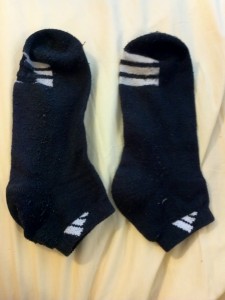I love the Olympics — enough so that I broke my moratorium on blog posting for the first time in four years, and that post four years ago was also about the Olympics. But I’m also interested in making them better, closer to what I consider the ideal of a thrilling showcase of human athleticism. Here are the events that should be removed from the 2020 Olympics.
For starters, I’m not saying that these events don’t require great skill or hard work, and I’m not saying they’re not worth doing; I’m simply saying they’re not worth doing at the Olympics. (And forget the Winter Olympics; that’s a topic for another time.) My arguments are based on common sense, not tradition, so if you’re a traditionalist, you might want to sit this one out.
Let’s start with an easy one:
Any event that requires walking instead of running (3)
Athletics: Men’s 20km Walk, Men’s 50km Walk, Women’s 20km Walk
In a race, you should go from point A to point B as fast as possible, and imposing an artificial restriction like walking is a joke. (A joke that still attracts dopers.) I’m fine with adding obstacles, such as hurdles, to races, but actually restricting the form of movement itself is inane.
Any event in which the primary means of evaluation is subjective (2)
Rhythmic Gymnastics: Individual All-Around, Group All-Around
Not only are such events easily rigged, they stifle innovation by putting a cap on technical prowess, and they favor the very loaded notion of “beauty” over power, which is antithetical to fair competition. When Artistic Gymnastics moved to an unlimited difficulty-based system, everyone won.
Any event that’s “synchronized” (6)
Diving: Men’s Synchronized 3m Springboard, Women’s Synchronized 3m Springboard. Men’s Synchronized 10m Platform, Women’s Synchronized 10m Platform; Synchronized Swimming: Duets, Teams
Sorry, this makes no sense to me. This isn’t even teamwork, reacting to each other and to a common opponent. It’s just doing the same thing at the same time.
Any event that categorizes by weight (63)
Boxing: Men’s Light Fly (46-49kg), Men’s Fly (52kg), Men’s Bantam (56kg), Men’s Light (60kg), Men’s Light Welter (64kg), Men’s Welter (69kg), Men’s Middle (75kg), Men’s Light Heavy (81kg), Men’s Heavy (91kg), Women’s Fly (48-51kg), Women’s Light (57-60kg); Judo: Women -48 kg, Women -52 kg, Women -57 kg, Women -63 kg, Women -70 kg, Women -78 kg, Men -60 kg, Men -66 kg, Men -73 kg, Men -81 kg, Men -90 kg, Men -100 kg; Rowing: Lightweight Women’s Double Sculls, Lightweight Men’s Double Sculls, Lightweight Men’s Four; Taekwondo: Men -58kg, Men -68kg, Men -80kg, Women -49kg, Women -57kg, Women -67kg; Weightlifting: Men’s 56kg, Men’s 62kg, Men’s 69kg, Men’s 77kg, Men’s 85kg, Men’s 94kg, Men’s 105kg, Women’s 48kg, Women’s 53kg, Women’s 58kg, Women’s 63kg, Women’s 69kg, Women’s 75kg; Wrestling: Men’s Greco-Roman 59 kg, Men’s Greco-Roman 66 kg, Men’s Greco-Roman 75 kg, Men’s Greco-Roman 85 kg, Men’s Greco-Roman 98 kg, Men’s Greco-Roman 130 kg, Men’s Freestyle 57 kg, Men’s Freestyle 65 kg, Men’s Freestyle 74 kg, Men’s Freestyle 86 kg, Men’s Freestyle 97 kg, Men’s Freestyle 125 kg, Women’s Freestyle 48 kg, Women’s Freestyle 53 kg, Women’s Freestyle 58 kg, Women’s Freestyle 63 kg, Women’s Freestyle 69 kg, Women’s Freestyle 75 kg
Okay, this is an enormous one. But think about it for a second: when you go to the Olympics, you want to see people who are the best at what they do. They are freaks of nature (and of hard work, and blah blah), and that’s precisely why they’re so captivating to watch. But imagine for a second if basketball or volleyball had a second medal for teams of people 6″ and under, or shotput had multiple category for people under certain weights. The fact is that those competitors would necessarily be no better than people competing with no restrictions; in fact, it would be comical to watch. Wow, that 5’11” guy is great, but LeBron would destroy him. Well, yeah — and yet, somehow people are okay with handing out medals by the fistful in analogous situations for all kinds of sports. I don’t care about the best weightlifter under 62kg, just as I don’t care about the best discus thrower under 62kg. Just show me the best in the world, bar none. You might just find some heroes who aren’t giants — and more power to them.
Any event where the humans aren’t the athletes (6)
Equestrian: Eventing Individual, Eventing Team, Dressage Individual, Dressage Team, Jumping Individual, Jumping Team
This choice is sure to evoke the strongest response of the list from the smallest segment of the population. But it takes years to train the horse! But the riders have to master giving incredibly subtle cues! And they train and are real athletes! Answers: who cares, who cares, and false. (See this year’s 62-year-old first-time Olympian, and just go ahead and watch the events.) Putting aside the fact that an extremely minuscule set of generally very entitled people even have any kind of access to a riding horse, the bottom line is that the horses are amazing, the people who ride them are effectively handlers, and this is little different from the Westminster Dog Show. Very skilled, yes, but it has no place in a celebration of human athleticism.
All swimming events other than freestyle (18)
Swimming: Women’s 100m Backstroke, Women’s 200m Backstroke, Women’s 100m Breaststroke, Women’s 200m Breaststroke, Women’s 100m Butterfly, Women’s 200m Butterfly, Women’s 200m Individual Medley, Women’s 400m Individual Medley, Women’s 4 x 100m Medley Relay, Men’s 100m Backstroke, Men’s 200m Backstroke, Men’s 100m Breaststroke, Men’s 200m Breaststroke, Men’s 100m Butterfly, Men’s 200m Butterfly, Men’s 200m Individual Medley, Men’s 400m Individual Medley, Men’s 4 x 100m Medley Relay
Ha, got ya on this one, suckers. You bought my race walking logic, and guess what, it applies perfectly well here as well. Swimming is a race, and saying you can’t go as fast as possible makes no sense. Imagine if there was a separate track event for sprinting the 100m backwards, or for throwing the discus with your off-hand, or for running a marathon on your tippy toes. That’s what this is. Furthermore, if you’re going to call the remaining events “freestyle”, let them really be freestyle. That means competitors should be allowed to do anything to get them to the finish line faster, including dolphin kicking or fish kicking as long as they can manage. Remember the Fosbury Flop? If someone comes up with a faster way to swim, I damn well want to see it.
Any event that requires shooting at a stationary target (16)
Archery: Men’s Individual, Women’s Individual, Men’s Team, Women’s Team; Shooting: Men’s 10m Air Pistol, Women’s 10m Air Pistol, Men’s 10m Air Rifle, Women’s 10m Air Rifle, Men’s 25m Rapid Fire Pistol, Women’s 25m Pistol, Men’s 50m Pistol, Men’s 50m Rifle Prone, Men’s 50m Rifle 3 Positions, Women’s 50m Rifle 3 Positions; Golf: Men’s Individual Stroke Play, Women’s Individual Stroke Play
I understand that shooting at a moving target (e.g. skeet, trap) is incredibly impressive, and requires a tremendous amount of hand-eye coordination, which is clearly athletic. Hitting a stationary target requires skill and precision, but not what I consider athleticism: coordination, strength, power, quickness, fitness, etc. It’s basically the same as bowling, billiards, snooker, or video games, which are certainly impressive in their own right. But they’re not in the Olympics, and neither should be these events. (I added golf in there mainly to piss off my golf-loving friends (love you guys!) but the same rationale actually applies.) I would gladly welcome them back with open arms if they added in moving targets. Imagine how cool that would be for archery!
Note: I don’t know enough about sailing or cycling to evaluate them.
Well, there you have it. A svelter Olympics with a third of the events removed would allow for a greater diversity of sports and formats in the future. And if you think about the greatest Olympic moments, virtually all would be intact in the new regime — the key sports are all still there. Even “volume champions”, a la Michael Phelps, would take on significance with fewer events; check out Usain Bolt, who’s aiming for “just” nine golds, but with a remarkably high profile.


